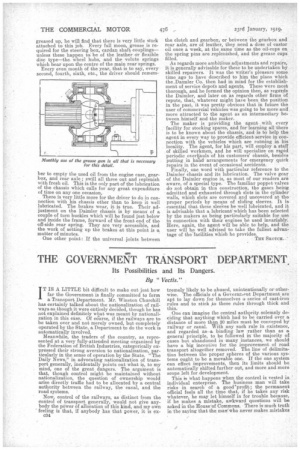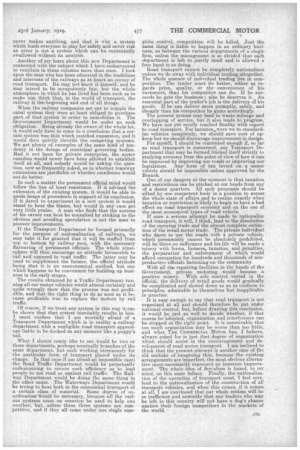THE GOVERNMEgT TRANSPORT DEPARTMENT,
Page 14

Page 15

If you've noticed an error in this article please click here to report it so we can fix it.
Its Possibilities and Its Dangers. By " Vectis."
IT IS A LITTLE bit difficult to make out just how far the Government is finally committed to form a Transport Department. Mr. Winston Churchill has certainly talked about the nationalization of railways as though it were entirely decided, though he has not explained definitely what was meant by nationalization in this case. Of course, if the railways are to be taken over and not merely owned, but completely operated by the State, a Department to do the work is automatically involved.
Meanwhile, the traders of the country, as represented at a very fully-attended meeting organized by the Federation of British Industries, categorically expressed their strong aversion to nationalization, particularly in the sense of operation by the State. "The Daily News," in advocating nationalization of transport generally, incidentally points out what is,, to rity mind, one of the great dangere. The argument is that, though control might be maintained without nationalization, the question of ownership would arise directly traffic had to be allocated by a central authority between the railway, the canal, and the road systems.
Now, control of the railways, as distinct from the control of transport generally, would not give anybody the power of allocation of this kind, and my own ' feeling is that, if anybody has that power, it is exon
trernely likely to be abused, unintentionally or otherwise. The officials of a Government Department are apt to lay down for themselves a series of cast-iron. rules and to stick p these rules through thick and thin.
One can imagine he central authority solemnly deciding that anything which had to 'be carried over a distance of more than 20 miles must be conveyed by railway or canal. With any such rule in existence, and regarded asea binding law rather than as a general principle, to be followed in the majority of cases but abandoned in .many instances, we should have a big incentive for the, improvement of road transport altogether removed. The. line of delimitation between the proper spheres of the various systems ought to be a movable one. If the one system can effect improvements, then its limits should be automatically shifted further out, and more and more scope left for development.
This is What happens when the control is vested in individual enterprise. The business man will take risks in search of a good profit; the permanent official feels all the time that, if be takes any risk whatever, he may let himself in for trouble because, if he makes a mistake, awkward questions will be asked in the Houseesf Commons. There is much truth in the saying that the mare who never makes mistakes never makes anything, and that is why a system which leads everyone to play for safety and never risk an error is not a system which can be contentedly swallowed without an analysis.
Another of my fears about this new Department is connected with the subject which I have endeavoured to ventilate in these columns more than once. I look upon the man who has been educated in the traditions and interests of the railways as at heart an enemy of road transport. He may not know it himself, and he may intend to be scrupulously fair, but the whole atmosphere in which he has lived has been such as to make him think that, in the world of transport, the railway it the' beginning and end of all things.
When the railway companies set out to cripple the canal system they were at least obliged to purchase part. of that system in order to immobilize it. The Government Department would be under no such obligation, Being already the owner of the whole lot, it would only have to come to a conclusion that a certain system was that which justified expansion, and it would then quietly throttle the competing systems.. We get plenty of examples of the same kind of tendency in the doings of municipal governing bodies. Had it not been for private enterprise, the motor omnibus would never have been allowed to establish itself at all, and nobody would be asking the question, now so frequently asked, as to whether tramway extensions are justifiable or whether omnibuses would not do better.
In such a matter the permanent official mind would follow the line of least resistance. If it advised the extension: of the existing system, it would be able to quote heaps of precedents in support of its conclusion. If it dared to experiment in a new system it would stand to bear the blame, but would in any case get very little praise. A man who finds that the success of his career can best be consulted by sticking to the obvious and avoiding speculation is not the man to pioneer improvements.
If the Transport Department be formed primarily for the purpose of nationalization of railways, we may take it for granted that it will be staffed from top to bottom by railway men, with the necessary flavouring of permanent officials. The whole atmosphere will then encourage an attitude favourable to rail and opposed to road traffic. The latter may be used to supplement the former, the official attitude being that it is an uneconomical method, but one which happens to be convenient for building up business in the early stages.
The results obtained by a Traffic Department runsung all our motor vehicles would almost certainly and quite wrongly show that the process was not profitable, and that the right thing to do as soon as it became profitable was to replace the motors by rail traffic.
Of course, if we treat any system in this way: it can be shown that that system inevitably results in loss. I must confess that I . am mortally afraid of a Transport Department which is in reality a-railway department with a negligible road transport appendage liable to be docked on any moment like a puppy's tail.
What I should really like to see would be two or three departments, 'perhaps nominally branches-of the same department, but each working strenuously for the particular form of transport placed under its charge. In that case (I am afraid an impossible case) the Road Traffic Department would be perpetually endeavouring to secure such efficiency as to lead people to use road as against rail traffic. The Railway Department would be doing the samething in the other sense. The Waterways Department would be trying to beat both in the economical transport of a certain class of material. Some degree of coordinatiosravould be necessary, because all the various systems must on occasion be used to help one another, but, unless these three systems are competitive, and if they all come under one single emu
piete control, competition will be killed. Just the same thing is liable to happen in an ordinary business, as between the various departments of a single firm, unless the management is sb divided that each department is left to justify itself and is allowed a free hand in so doing.
Road transport cannot be completely nationalized unless we do away with individual trading altogether. The whole essence of individual trading lies in competition. The trader must do better, either as regards price, quality, or the convenience of his customers, than his competitor can do. If he succeeds he gets the business ; also he deserves it An essential part of the trader's job is the delivery Ot his goods. If he can deliver more promptly, safely, and cheaply than his competitor he gains accordingly.
The present system may lead to waste mileage and overlapping of service, but it also leads to progress. We have not yet nearly reached finality with regard to road transport. For msta.nce,overe we to standardize vehicles completely, we should save cost of upkeep but we should discourage improvement in design. For myself, I should be contented enough if, so far as road transport is concerned, any Transport Department that may be formed limited itself strictly to studying economy from the point of view of how it can be improved by improving our roads or improving our legislation. Any form of tax levied on a motor vehicle should be impossible unless approved by the Branch.
One of our dangers at the moment is that taxation and restrictions can be pitched at our heads from any of a dozen quarters. All such proposals should be sifted by one competent body in a position to assess the whole state of affairs and to realize exactly when taxation or restriction is likely to begin to have a bad effect on road transport economy and on the use of the most economical types of road vehicle. If once a serious attempt be made to nationalize road transport, it will, I think, lead to the dissolution of. the carrying trade and the almost complete extinction of the retail motor trade. The private individual who dares to use the roads with a private vehicle, which presumably cannot be absolutely prohibited, will be there on sufferance and his life will be made a misery with forms, licences, taxation, and penalties, the preparation and enforcement of which would afford occupation for hundreds and thousands-of nonproductive officials battening-on the community.
With all the repairing facilities in the hands of the Government, private motoring would become a positive misery. With sole control vested in the official, the delivery of retail goods would gradually be complicated and slowed down so as to conform to principles, admirable in themselves but inapplicable in practice.
It is easy enough to say that road transport is not organized at all and should therefore be put under national control, but, before drawing this conclusion, it would be just as well to decide whether, if that course be 'adopted, organization and interference can be stopped at the right point. It is conceivable that too much organization may be worse than too little, and what THE COMMERCIAL MOTOR has, I believe, always asked for is just that degree of organization which should assist in the encouragement and development of road motor transport I am inclined to think that the present attempt is another case of the old mistake of imagining that, because the existing arrangements are imperfect, the most obvious alternative rnustnecessarily represent an immense improvement. The whole idea of Soc'alism is based, to my mind, on this same fallacy. Finally, the nationalization of the operation of transport must, I feel sure, lead to the nationalization of the construction of all transport vehicles, and when this comes, if it comes at all, I am convinced that our whole system will be so inefficient and unwieldy that any traders who may be left in this country will not have a dog's chance against their foreign competitors in the markets of the world.






















